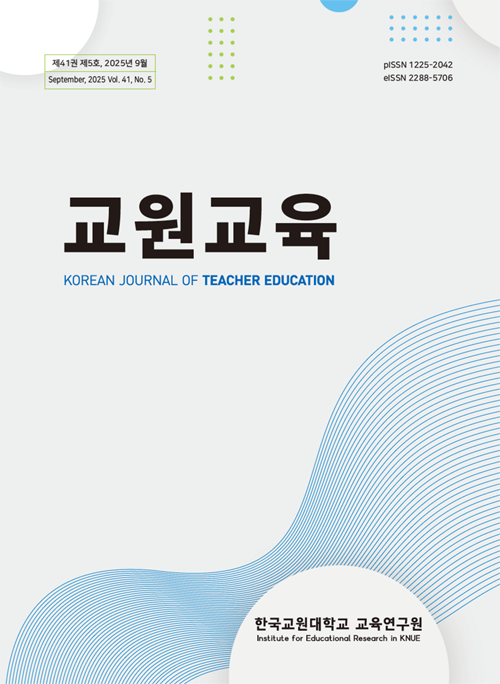- 영문명
- The Structural Relationship among Positive Psychological Capital, Intrinsic Motivation, and Class Flow in Middle School Students Participating in Physical Education
- 발행기관
- 한국교원대학교 교육연구원
- 저자명
- 박지흠(Ji-Heum Park)
- 간행물 정보
- 『교원교육』제41권 제5호, 355~370쪽, 전체 16쪽
- 주제분류
- 사회과학 > 교육학
- 파일형태
- 발행일자
- 2025.09.30

국문 초록
연구목적: 최근 우리나라 학교 교육에서는 자기주도적 학습 역량이 강조되고 있으며, 체육 교과 역시 학생의 자율성과 주도성을 기반으로 건강한 생활 습관과 전인적 성장을 지원하는 것을 목표로 한다. 본 연구는 중학생을 대상으로 긍정심리자본(독립변인), 내적 동기(매개변인), 수업 몰입(종속변인) 간의 구조적 관계를 규명하고자 한다. 이를 통해 체육 수업에서 학생들의 몰입을 높일 수 있는 심리적 요인을 확인하고, 효과적인 체육 수업 운영을 위한 교육적 시사점을 제시하는 것을 목적으로 한다.
연구방법: 연구 참여자는 S지역 소재 중학생 450명이며, 최종 연구에 활용된 설문지는 416부이다. 자료분석에는 SPSS 29.0과 AMOS 29.0 프로그램을 활용하였으며, 기술통계, 상관분석, 구조방정식모델링을 통해 데이터를 분석하였다.
연구결과: 분석 결과는 다음과 같다. 첫째, 체육 수업 참여 중학생의 긍정심리자본은 내적 동기에 긍정적인 영향을 미치는 것으로 나타났다(β=.810, p<.001). 둘째, 체육 수업 참여 중학생의 내적 동기는 수업 몰입에 긍정적인 영향을 미치는 것으로 나타났다(β=.727, p<.001). 셋째, 체육 수업 참여 중학생의 긍정심리자본은 수업 몰입에 긍정적인 영향을 미치는 것으로 나타났다(β=.213, p<.01). 넷째, 체육 수업 참여 중학생의 긍정심리자본과 수업 몰입의 관계에서 내적 동기는 매개효과를 지니는 것으로 나타났다(β=.589, p<.01).
결론: 이러한 결과는 체육 수업이 단순한 신체 활동을 넘어 학생들의 심리적 자원을 개발하고 자발적 학습 태도를 형성하는 중요한 교육적 장이 될 수 있음을 시사한다. 따라서 체육교사는 정서적 지지와 동기 유발 전략을 통해 학생들의 긍정심리자본과 내적 동기를 강화함으로써 수업 몰입을 촉진해야 할 것이다.
영문 초록
Purpose: Recently, self-directed learning competence has been emphasized in Korean school education, and physical education (PE) also aims to support healthy lifestyles and holistic development based on students' autonomy and initiative. This study investigated the structural relationships among positive psychological capital (independent variable), intrinsic motivation (mediating variable), and class flow (dependent variable) in middle school students, with the aim of identifying psychological factors that enhance students' flow in PE classes and providing educational implications for effective PE instruction.
Methods: Participants were 450 middle school students from S city, and a total of 416 valid questionnaires were analyzed. Data were processed using SPSS 29.0 and AMOS 29.0, employing descriptive statistics, correlation analysis, and structural equation modeling.
Results: The results showed that: (1) positive psychological capital had a significant positive effect on intrinsic motivation (β = .810, p < .001); (2) intrinsic motivation had a significant positive effect on class flow (β = .727, p < .001); (3) positive psychological capital also had a significant positive effect on class flow (β = .213, p < .01); and (4) intrinsic motivation mediated the relationship between positive psychological capital and class flow (β = .589, p < .01).
Conclusion: These findings suggest that PE classes should not only promote physical health but also serve as an important educational setting for developing students' positive psychological resources and fostering self-directed learning attitudes. PE teachers are encouraged to provide continuous emotional support and motivational strategies to enhance students' positive psychological capital and intrinsic motivation, thereby promoting higher levels of class flow.
목차
Ⅰ. 서 론
Ⅱ. 연구 방법
Ⅲ. 연구 결과
Ⅳ. 논의 및 결론
참고문헌
키워드
해당간행물 수록 논문
참고문헌
최근 이용한 논문
교보eBook 첫 방문을 환영 합니다!

신규가입 혜택 지급이 완료 되었습니다.
바로 사용 가능한 교보e캐시 1,000원 (유효기간 7일)
지금 바로 교보eBook의 다양한 콘텐츠를 이용해 보세요!



